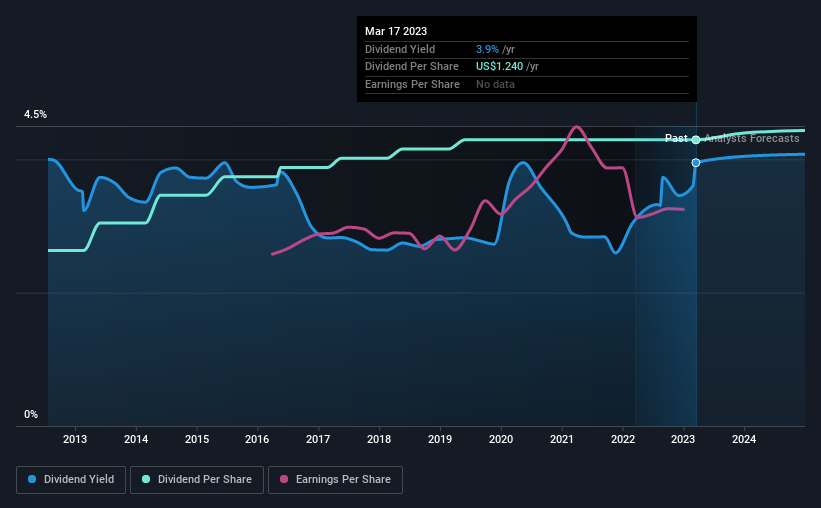- United States
- /
- Banks
- /
- NasdaqCM:FNWD
Be Sure To Check Out Finward Bancorp (NASDAQ:FNWD) Before It Goes Ex-Dividend
Readers hoping to buy Finward Bancorp (NASDAQ:FNWD) for its dividend will need to make their move shortly, as the stock is about to trade ex-dividend. The ex-dividend date occurs one day before the record date which is the day on which shareholders need to be on the company's books in order to receive a dividend. The ex-dividend date is of consequence because whenever a stock is bought or sold, the trade takes at least two business day to settle. Therefore, if you purchase Finward Bancorp's shares on or after the 23rd of March, you won't be eligible to receive the dividend, when it is paid on the 6th of April.
The company's next dividend payment will be US$0.31 per share, on the back of last year when the company paid a total of US$1.24 to shareholders. Based on the last year's worth of payments, Finward Bancorp has a trailing yield of 3.9% on the current stock price of $31.4. If you buy this business for its dividend, you should have an idea of whether Finward Bancorp's dividend is reliable and sustainable. As a result, readers should always check whether Finward Bancorp has been able to grow its dividends, or if the dividend might be cut.
Check out our latest analysis for Finward Bancorp
Dividends are typically paid from company earnings. If a company pays more in dividends than it earned in profit, then the dividend could be unsustainable. Fortunately Finward Bancorp's payout ratio is modest, at just 34% of profit.
Generally speaking, the lower a company's payout ratios, the more resilient its dividend usually is.
Click here to see the company's payout ratio, plus analyst estimates of its future dividends.

Have Earnings And Dividends Been Growing?
Stocks in companies that generate sustainable earnings growth often make the best dividend prospects, as it is easier to lift the dividend when earnings are rising. Investors love dividends, so if earnings fall and the dividend is reduced, expect a stock to be sold off heavily at the same time. With that in mind, we're encouraged by the steady growth at Finward Bancorp, with earnings per share up 2.3% on average over the last five years.
Another key way to measure a company's dividend prospects is by measuring its historical rate of dividend growth. In the past 10 years, Finward Bancorp has increased its dividend at approximately 5.0% a year on average. It's encouraging to see the company lifting dividends while earnings are growing, suggesting at least some corporate interest in rewarding shareholders.
The Bottom Line
Has Finward Bancorp got what it takes to maintain its dividend payments? It has been growing its earnings per share somewhat in recent years, although it reinvests more than half its earnings in the business, which could suggest there are some growth projects that have not yet reached fruition. We think this is a pretty attractive combination, and would be interested in investigating Finward Bancorp more closely.
Wondering what the future holds for Finward Bancorp? See what the two analysts we track are forecasting, with this visualisation of its historical and future estimated earnings and cash flow
A common investing mistake is buying the first interesting stock you see. Here you can find a full list of high-yield dividend stocks.
The New Payments ETF Is Live on NASDAQ:
Money is moving to real-time rails, and a newly listed ETF now gives investors direct exposure. Fast settlement. Institutional custody. Simple access.
Explore how this launch could reshape portfolios
Sponsored ContentNew: AI Stock Screener & Alerts
Our new AI Stock Screener scans the market every day to uncover opportunities.
• Dividend Powerhouses (3%+ Yield)
• Undervalued Small Caps with Insider Buying
• High growth Tech and AI Companies
Or build your own from over 50 metrics.
Have feedback on this article? Concerned about the content? Get in touch with us directly. Alternatively, email editorial-team (at) simplywallst.com.
This article by Simply Wall St is general in nature. We provide commentary based on historical data and analyst forecasts only using an unbiased methodology and our articles are not intended to be financial advice. It does not constitute a recommendation to buy or sell any stock, and does not take account of your objectives, or your financial situation. We aim to bring you long-term focused analysis driven by fundamental data. Note that our analysis may not factor in the latest price-sensitive company announcements or qualitative material. Simply Wall St has no position in any stocks mentioned.
About NasdaqCM:FNWD
Finward Bancorp
Operates as the holding company for Peoples Bank that provides various banking products and services.
Flawless balance sheet and fair value.
Market Insights
Weekly Picks

Early mover in a fast growing industry. Likely to experience share price volatility as they scale


A case for CA$31.80 (undiluted), aka 8,616% upside from CA$0.37 (an 86 bagger!).


Moderation and Stabilisation: HOLD: Fair Price based on a 4-year Cycle is $12.08
Recently Updated Narratives


Title: Market Sentiment Is Dead Wrong — Here's Why PSEC Deserves a Second Look


An amazing opportunity to potentially get a 100 bagger

Amazon: Why the World’s Biggest Platform Still Runs on Invisible Economics
Popular Narratives


Crazy Undervalued 42 Baggers Silver Play (Active & Running Mine)


NVDA: Expanding AI Demand Will Drive Major Data Center Investments Through 2026


MicroVision will explode future revenue by 380.37% with a vision towards success
Trending Discussion


